Comparing The Takings Of Pelham 123
Today, Tony Scott's rendition of The Taking of Pelham 123 hits theaters. Lovers of Pelham subway-related film will know that the movie is based on a novel by Morton Freedgood (psuedonym: John Godey), in which four armed men hijack a New York City subway train and hold its hostages for ransom. It's been made into a film twice before: Once in Joseph Sargent's 1974 film The Taking of Pelham One Two Three starring Walter Matthau, and again as a 1998 TV movie starring Edward James Olmos.
As a fan of Joseph Sargent's original film, I thought it might be interesting to compare his version with Scott's new version, as I think some of the choices Scott made are pretty fascinating. If you haven't seen the original, I'd suggest you watch before you read this, as I think it's a great film that still holds up today. For obvious reasons, this article will contain massive spoilers for Joseph Sargent's version of the film (1974) and Tony Scott's version (2009). [Hit the jump at your own risk!]
Obviously, I can't cover all the elements of both films, but the elements I do cover should give you my general impressions on how the movies stack up. I will refer to Joseph Sargent's film as The Taking of Pelham One Two Three, so as to distinguish it from Scott's The Taking of Pelham 123.
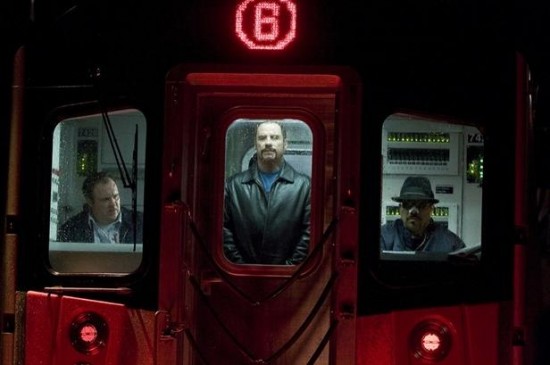 The Heist - The logistics of both heists are fairly similar, with four gunmen stopping a subway car in the middle of a tunnel and holding one car hostage for much of the runtime of each movie. In Sargent's version of the movie, we're slowly introduced to the four men, each of whom wears thick glasses and overcoats. Mysteriously, they refer to themselves as different colors, a plot device that Tarantino's Reservoir Dogs would later use. Scott's version relegates these introductions to the opening credits (shot, as with much of the movie, like a music video) and jumps right into the heist: Travolta sticks his gun through a window and we're off to the races.
The Heist - The logistics of both heists are fairly similar, with four gunmen stopping a subway car in the middle of a tunnel and holding one car hostage for much of the runtime of each movie. In Sargent's version of the movie, we're slowly introduced to the four men, each of whom wears thick glasses and overcoats. Mysteriously, they refer to themselves as different colors, a plot device that Tarantino's Reservoir Dogs would later use. Scott's version relegates these introductions to the opening credits (shot, as with much of the movie, like a music video) and jumps right into the heist: Travolta sticks his gun through a window and we're off to the races.
What I love about Sargent's version is that it takes it time to build to the ultimate hijacking. It's clear that the men are up to something, but we don't know exactly what that is, and that tension successfully drives the rest of the film. The heist itself is meticulous and feels controlled and planned to the last detail. Travolta's heist feels like it could have been planned that morning, although it does receive bonus points for the hidden strategy of leveraging markets to generate hundreds of millions of dollars (while Sargent's heist's ransom demand was for the Dr. Evil-like sum of one MILLION dollars).
But in the end, Sargent's rendition is ultimately more satisfying because it allows the movie to be permeated with a sense of foreboding dread. This is ruined in Scott's version by many of his directorial choices, not the least of which are the freeze frame minute countdowns that punctuate the film (and which punctuated my theater with laughter). Winner: The Taking of Pelham One Two Three.
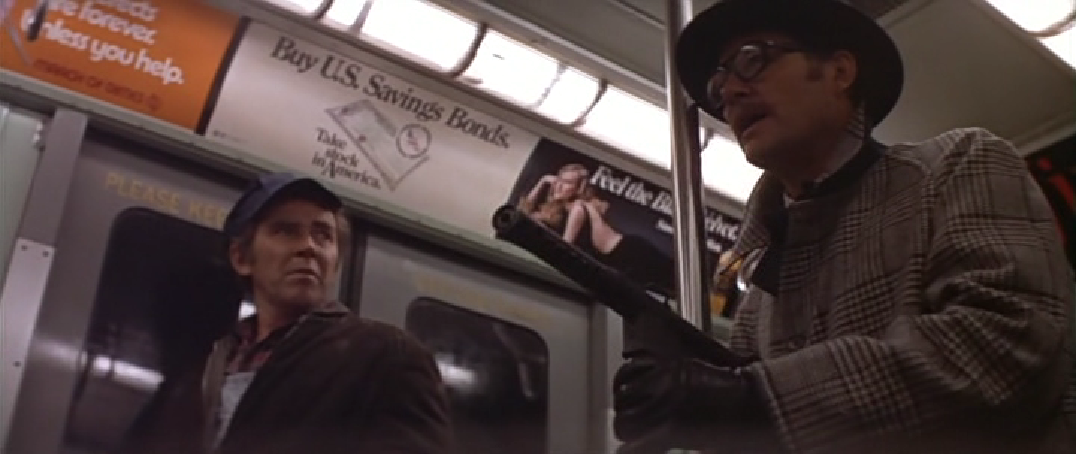 Ryder (AKA Mr. Blue) - Robert Shaw's lead perpetrator, Mr. Blue, is everything I want in a hijacker: calm, collected, cold, and calculating. His character is completely believable (at a crucial moment in the film, he even demonstrates mercy, extending his deadline for the money temporarily), and for that reason, all the more terrifying. Meanwhile, Travolta's lead hijacker, Ryder, is every hostage's nightmare: completely unstable, bombastic, and petulant. Travolta plays Ryder like a mentally unhinged 18-year old male, a wildly implausible ex-investment banker who went to jail, got pissed off, tattooed his neck, and decided to hijack a train to make millions. While Travolta's portrayal resulted in many more humorous moments throughout the film, Shaw's Mr. Blue is the true criminal mastermind here. Winner: The Taking of Pelham One Two Three, by far.
Ryder (AKA Mr. Blue) - Robert Shaw's lead perpetrator, Mr. Blue, is everything I want in a hijacker: calm, collected, cold, and calculating. His character is completely believable (at a crucial moment in the film, he even demonstrates mercy, extending his deadline for the money temporarily), and for that reason, all the more terrifying. Meanwhile, Travolta's lead hijacker, Ryder, is every hostage's nightmare: completely unstable, bombastic, and petulant. Travolta plays Ryder like a mentally unhinged 18-year old male, a wildly implausible ex-investment banker who went to jail, got pissed off, tattooed his neck, and decided to hijack a train to make millions. While Travolta's portrayal resulted in many more humorous moments throughout the film, Shaw's Mr. Blue is the true criminal mastermind here. Winner: The Taking of Pelham One Two Three, by far.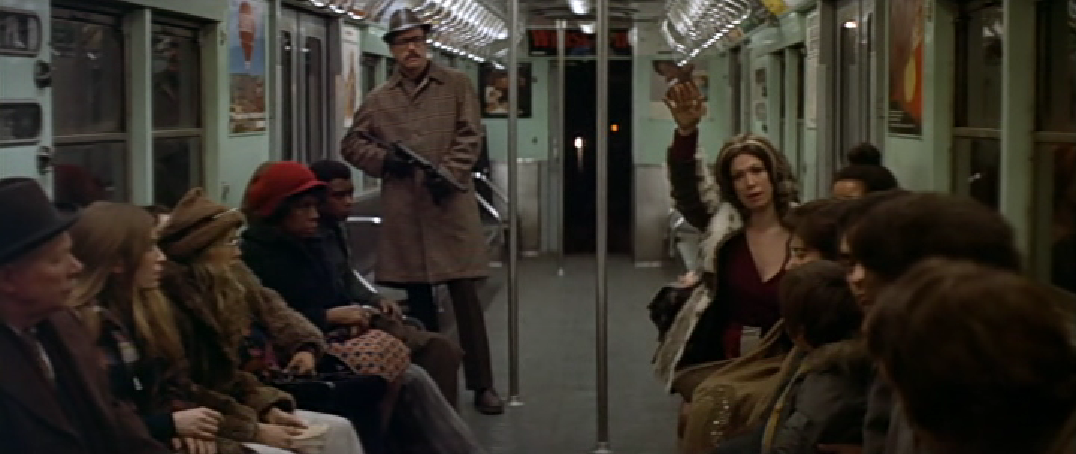 The Hostages – In The Taking of Pelham One Two Three, the hostages are given names in the credits like "The Homosexual," "The Salesman," "The Delivery Boy," "The Hooker," "The Alcoholic," "The Spanish Woman," etc. In other words, whether politically correct or not, the Pelham train became a metaphor for New York City. Nonetheless, for the most part, they are reduced to the role of props, although they do get some nice comic relief moments throughout the film. In Scott's version, we get a few more details about some of the passengers, including a guy who can't decide whether to commit to his webcamming girlfriend, and a quasi-decent but predictable hero moment from Gbenga Akinnagbe (who plays Chris Partlow in The Wire). Winner: The Taking of Pelham 123, barely.
The Hostages – In The Taking of Pelham One Two Three, the hostages are given names in the credits like "The Homosexual," "The Salesman," "The Delivery Boy," "The Hooker," "The Alcoholic," "The Spanish Woman," etc. In other words, whether politically correct or not, the Pelham train became a metaphor for New York City. Nonetheless, for the most part, they are reduced to the role of props, although they do get some nice comic relief moments throughout the film. In Scott's version, we get a few more details about some of the passengers, including a guy who can't decide whether to commit to his webcamming girlfriend, and a quasi-decent but predictable hero moment from Gbenga Akinnagbe (who plays Chris Partlow in The Wire). Winner: The Taking of Pelham 123, barely.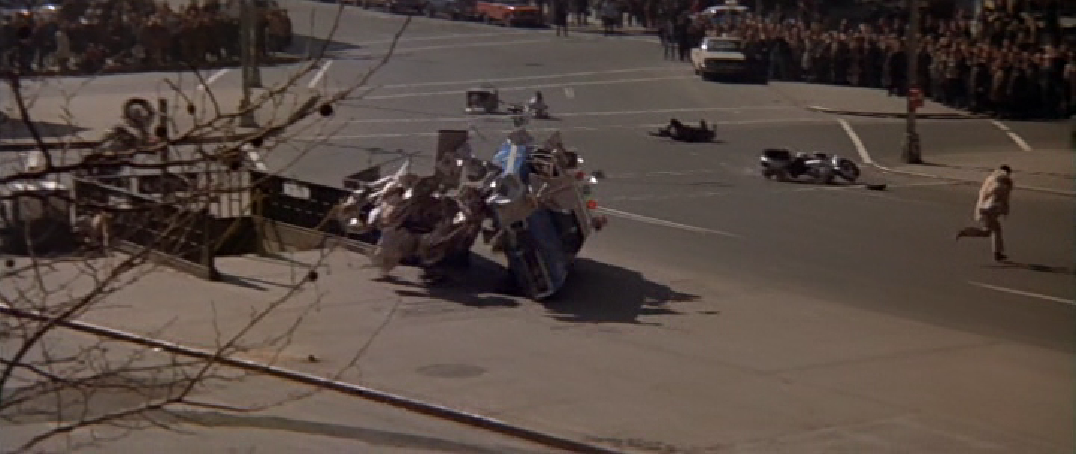 The Money Run – Halfway through both films, there's a crazy drive that takes place through the streets of New York, as the NYPD rush to get the money to the station to beat the deadline. I enjoyed Sargent's version because it actually gets into the mechanics of how people physically counted the money (and how that factors into the actual deadline), whereas in most heist films, the audience has to accept that the money simply appears. However, Scott's is also great because not only is the police car completely smashed, then hurled over a bridge onto the ground below, it's also hit by other pedestrian cars as well. Audacious. Winner: Tie.
The Money Run – Halfway through both films, there's a crazy drive that takes place through the streets of New York, as the NYPD rush to get the money to the station to beat the deadline. I enjoyed Sargent's version because it actually gets into the mechanics of how people physically counted the money (and how that factors into the actual deadline), whereas in most heist films, the audience has to accept that the money simply appears. However, Scott's is also great because not only is the police car completely smashed, then hurled over a bridge onto the ground below, it's also hit by other pedestrian cars as well. Audacious. Winner: Tie.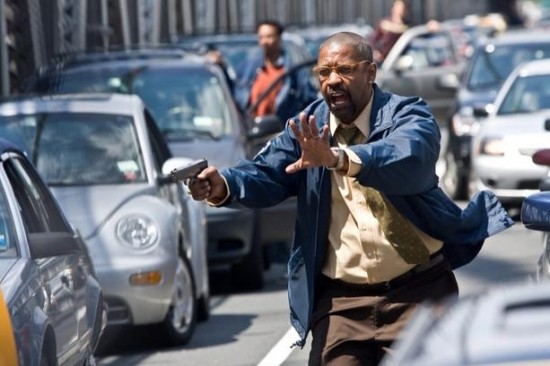 Walter Garber - Denzel Washington is a fabulous actor, but his character of Victor Garber in The Taking of Pelham 123 plays out exactly as you might predict: By the end of the film, Garber is transformed from an MTA employee into a supercop, chasing down bad guys and jumping across train rails. Meanwhile, Walter Matthau is a convincing everyman who just happens to wind up in the wrong situation on the wrong day. The moment where he flips out at one of his colleagues, who's been bitching at him the entire day, is satisfying and relatable. I like the fact that they gave Garber some backstory and made him a man struggling with his own demons of corruption, but there's something really appealing about Matthau's character, given that he's so much more believable. Winner: The Taking of Pelham One Two ThreeThe Score - No contest here: David Shire's score for the original wins by a longshot. While I'm a huge fan of Harry Gregson-Williams, there's nothing at all remarkable about the generic action-y music in The Taking of Pelham 123, whereas Shire's score continues to make you feel like a badass when you listen to it, even today. Here's a clip:
Walter Garber - Denzel Washington is a fabulous actor, but his character of Victor Garber in The Taking of Pelham 123 plays out exactly as you might predict: By the end of the film, Garber is transformed from an MTA employee into a supercop, chasing down bad guys and jumping across train rails. Meanwhile, Walter Matthau is a convincing everyman who just happens to wind up in the wrong situation on the wrong day. The moment where he flips out at one of his colleagues, who's been bitching at him the entire day, is satisfying and relatable. I like the fact that they gave Garber some backstory and made him a man struggling with his own demons of corruption, but there's something really appealing about Matthau's character, given that he's so much more believable. Winner: The Taking of Pelham One Two ThreeThe Score - No contest here: David Shire's score for the original wins by a longshot. While I'm a huge fan of Harry Gregson-Williams, there's nothing at all remarkable about the generic action-y music in The Taking of Pelham 123, whereas Shire's score continues to make you feel like a badass when you listen to it, even today. Here's a clip:
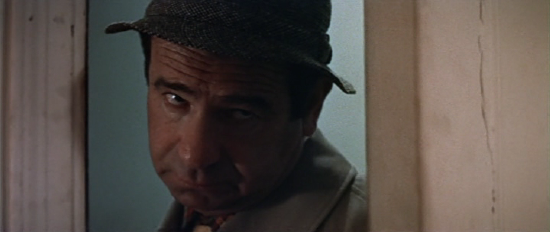 The Denouement - Here I refer to both the ending of the heist as well as the ending of the film. In the original film, Mr. Blue electrocutes himself to death using the third rail, which isn't particularly satisfying and looks fairly ridiculous. Walter Matthau then hunts down the final hijacker with the help of Jerry Stiller. In a tense scene in the conductor's apartment, Matthau almost discovers a bundle of cash that would give the guy away, but it's swept under the bed at the last second. The conductor is about to get away with the whole thing before his sneeze comically gives him away.
The Denouement - Here I refer to both the ending of the heist as well as the ending of the film. In the original film, Mr. Blue electrocutes himself to death using the third rail, which isn't particularly satisfying and looks fairly ridiculous. Walter Matthau then hunts down the final hijacker with the help of Jerry Stiller. In a tense scene in the conductor's apartment, Matthau almost discovers a bundle of cash that would give the guy away, but it's swept under the bed at the last second. The conductor is about to get away with the whole thing before his sneeze comically gives him away.
In Scott's version, Garber tracks down Ryder in a mind-numbingly protracted chase sequence and has a final confrontation on the Manhattan Bridge. Then, a nice moment with the mayor (James Gandolfini), before heading home to his wife with the milk she asked him to bring home. The film ends with a freeze frame on Denzel's gorgeous smile (WTF?). These endings are so vastly different as to defy comparison, and I think they both have their advantages and their flaws. We'll leave this one be. Winner: Tie.
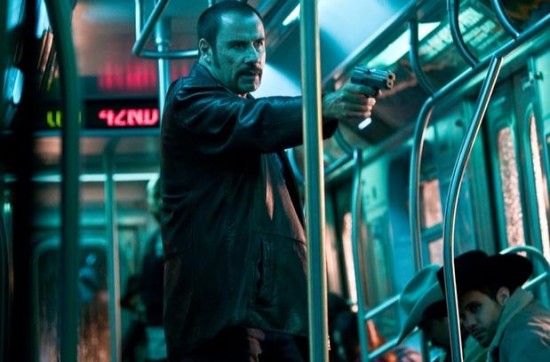 Conclusion - While I really enjoyed Sargent's film, I felt that there was actually a lot of potential for it to be remade into a thriller with a pace suitable for today's audiences. Scott's film is an enjoyable and watchable one, but its villain is ultimately not as compelling and its style is too headache- and laugh-inducing to inspire a great deal of tension. Perhaps its biggest crime? It's not even as suspenseful as its predecessor, which was crafted 35 years ago. You could do worse things than see The Taking of Pelham 123 this weekend but if you want a memorable film-watching experience, I'd rent The Taking of Pelham One Two Three instead.
Conclusion - While I really enjoyed Sargent's film, I felt that there was actually a lot of potential for it to be remade into a thriller with a pace suitable for today's audiences. Scott's film is an enjoyable and watchable one, but its villain is ultimately not as compelling and its style is too headache- and laugh-inducing to inspire a great deal of tension. Perhaps its biggest crime? It's not even as suspenseful as its predecessor, which was crafted 35 years ago. You could do worse things than see The Taking of Pelham 123 this weekend but if you want a memorable film-watching experience, I'd rent The Taking of Pelham One Two Three instead.
